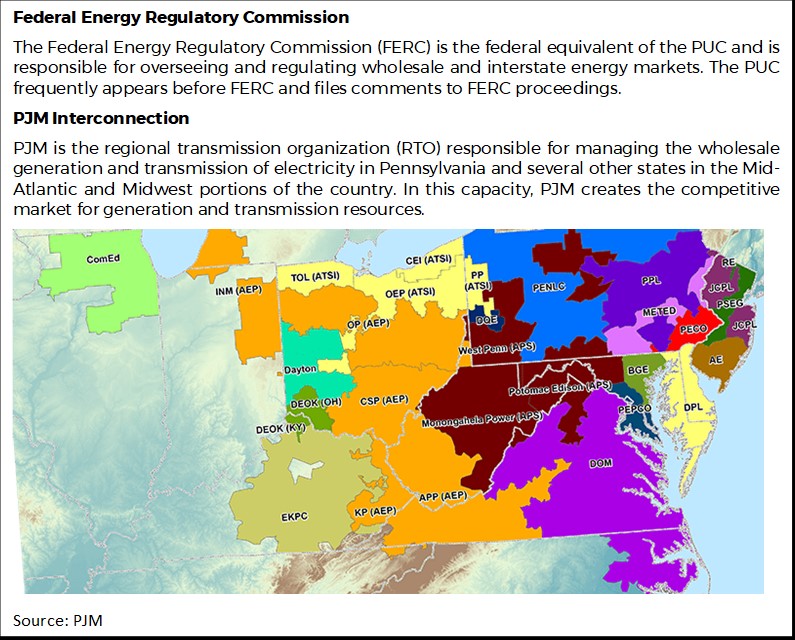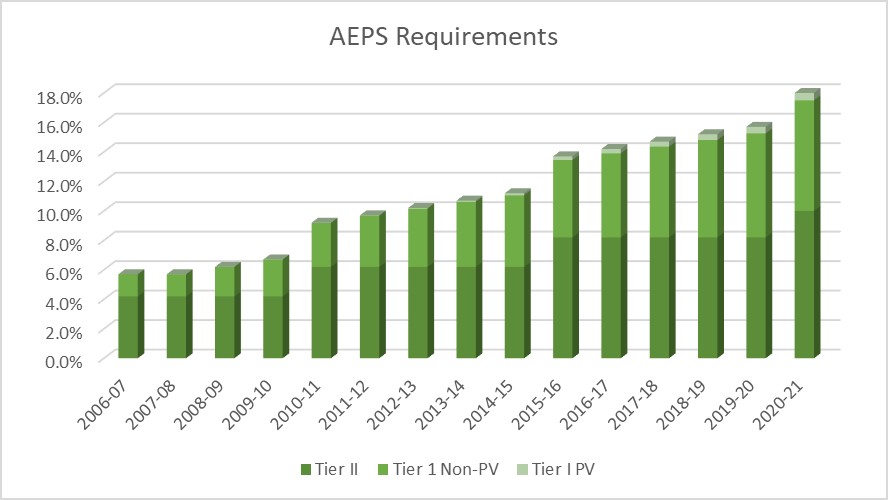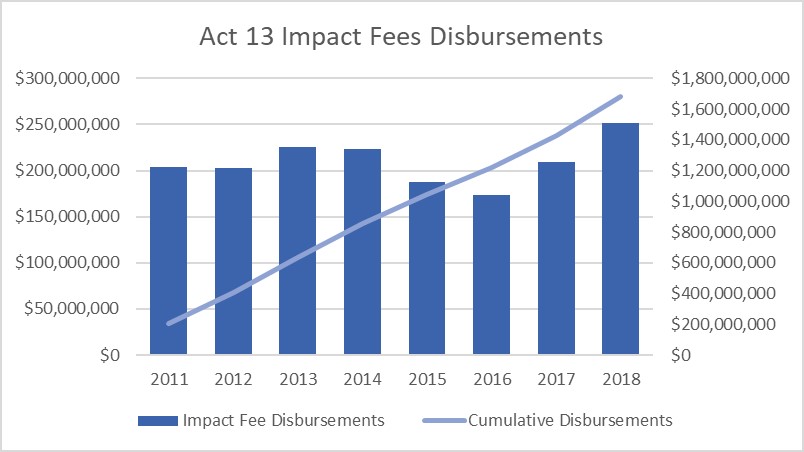The Pennsylvania Public Utility Commission (PUC)
By Patrick Shaughnessy , Senior Budget Analyst | 4 years ago
Environment & Energy Analyst: Gueorgui Tochev, Senior Budget Analyst
The Pennsylvania Public Utility Commission (PUC) is an independent agency that regulates the provision of electricity, natural gas, steam, telecommunications, water, wastewater, and transportation services throughout Pennsylvania. In total, the Commission oversees nearly 7,000 entities that provide utility services.

HISTORY
The PUC was created in 1937 to replace the Public Service Commission. It is tasked with the regulation of utility companies for price, safety, and reliability.
The Commission itself is composed of five commissioners appointed by the Governor and confirmed by the Senate. Each commissioner serves a five-year term, with terms staggered such that one seat opens each year. Statute requires that no more than three commissioners can be members of one political party.
The Commission was originally established by Act 286 of 1937, which was subsequently repealed and replaced by Title 66 of the Pennsylvania Consolidated Statutes.
FUNDING
|
|
2016/17
|
2017/18
|
2018/19
|
2019/20
|
2020/21
|
|
General Government Operations
|
$71,947,000
|
$72,766,000
|
$74,185,000
|
$75,533,000
|
$78,061,000
|
|
Natural Gas Pipeline Safety (F)
|
$1,425,000
|
$3,840,000
|
$3,977,000
|
$4,414,000
|
$3,892,000
|
|
Motor Carrier Safety (F)
|
$1,255,000
|
$1,697,000
|
$2,090,000
|
$1,138,000
|
$1,130,000
|
The Public Utility Commission is funded by assessments levied on the utilities it regulates. Assessments are deposited in a restricted revenue account of the General Fund and are appropriated each year in a standalone appropriation bill – one of the “housekeeping bills” that must pass each year as part of the annual budget process. Assessments for the PUC are capped as a share of the total revenues of all the utilities it regulates. The current cap is set at 0.3 percent.
The 2020/21 budget for the PUC totaled $83.083 million covering a complement of 526 employees, comprising two federal appropriations for $5.022 million and a state appropriation for $78.061 million. The federal appropriations cover costs associated with the commission’s natural gas pipeline and motor carrier safety responsibilities.
PUC FUNCTIONS
Ratemaking
One of the PUC’s primary jobs is to approve rates for utilities it regulates. The Commission is tasked with setting rates that are just and reasonable.
As a condition of its certificate of public convenience, a utility must have their rates and spending plans approved by the commission. Before a rate change can be effectuated, the plan must be submitted to the PUC. At that time, the proceeding is turned over to an administrative law judge tasked with reviewing all evidence from the utility and any other person or entity which intervenes in the case.
Statutory Respondents
Two independent agencies intervene in many or most utility proceedings for the Public Utility Commission. The Office of Small Business Advocate and the Office of Consumer Advocate are statutorily tasked with representing the interests of small businesses and residential customers, respectively, in proceedings before the PUC. Like the Commission itself, the budgets for these two offices are funded from assessments on regulated utilities.
Safety & Reliability
Part of the PUC’s oversight extends to the safety and reliability of the services provided by regulated utilities. The Commission tracks several reliability benchmarks, such as the average number of outage minutes per year. The PUC also sets minimum targets for those benchmarks and may require corrective action from utilities which fail to meet them.
The Commission’s reliability reports can be found on its website.
Customer Assistance
The PUC offers, or requires regulated utilities to offer, a variety of programs to aid customers facing financial difficulties. Among these are:
- Budget Billing – Energy use can vary widely over the course of a year, mainly due to weather. However, customers with tighter budgets benefit from having a predictable energy bill each month. Budget billing allows customers to have a set bill that will be the same each month. Utilities are only permitted to adjust this bill amount up or down four times per year.
- Hardship Funds – Many utility companies maintain hardship funds that provide grants to customers who are ineligible for other assistance programs and are facing exigent circumstances.
- Customer Assistance Program – Each regulated electric and natural gas utility is required to administer a Customer Assistance Program (CAP) to provide financial aid to low-income ratepayers.
Consumer Affairs
The Commission’s Bureau of Consumer Services (BCS) addresses ratepayer complaints and other customer service issues. Depending on the type and severity of the issue, BCS may either address the issue informally if possible or, where necessary, elevate the concern to a formal complaint which may require adjudication.
Office of Administrative Law Judge
The Commission maintains the Office of Administrative Law Judge to adjudicate issues under its jurisdiction. ALJs are responsible for hearing cases brought to the Commission that may range from disputes over service quality or price to fully litigated rate cases involved dozens of parties. Some ALJ decisions are presumed final, while others require action by the Commission itself before they go into effect.
ENERGY
Electricity
There are three main components to America’s electric grid.
- Generation consists of the power plants and facilities that produce electricity.
- Transmission makes up the inter- or intrastate high-voltage infrastructure that moves electricity from generation facilities to communities.
- Distribution is the system of wires and associated facilities that provide electricity to individual residential, commercial, and industrial customers.

In Pennsylvania, the generation and transmission systems are competitive markets that are mostly regulated by the Federal Energy Regulatory Commission (FERC) with only minimal oversight by the Public Utility Commission. The distribution system, conversely, is directly regulated by the PUC for price, safety, and reliability.
Retail Market Competition
Pursuant to the Electricity Generation Customer Choice and Competition Act of 1996, Pennsylvania began a process of opening the generation component of electricity to competition. While the regulated electric distribution companies (EDCs) would continue to provide the distribution service under the supervision of the PUC, the generation commodity would shift to a competitive market in which customers could choose offerings from among Commission licensed Electric Generation Suppliers (EGSs).

While customers have the option to shop with EGSs, EDCs are still required to provide default service for those who choose not to shop. This service is regulated by the PUC. The Price to Compare (PTC) is the rate charged for default service, which also serves as the basis to evaluate prices offered by EGSs.
Act 129
Act 129 of 2008 created energy efficiency and conservation targets for Pennsylvania’s largest electric distribution companies. The act required each of these EDCs to develop a plan to reduce total electricity consumption by a set amount each year. These plans included rebates for energy efficient lights and appliances; incentives for changes in energy use; and many other conservation measures.
Act 129 also required the state’s major EDCs to replace their existing meter infrastructure with new smart meters. Smart meters use wireless communications technology to communicate upstream with the electric grid and downstream with devices within the home. Smart meters are intended to improve reliability by more quickly pinpointing outages and to increase the flexibility of the grid by facilitating dynamic control of supply and demand.
Alternative Energy Portfolio Standards
Act 213 of 2004 established alternative energy portfolio standards (AEPS) for all EDCs and EGSs in Pennsylvania. Act 213 divided alternative energy sources into three groups: Tier II, Tier I (non-photovoltaic), and Tier I (photovoltaic).
For each megawatt of electricity and EDC or EGS sells in Pennsylvania, it must purchase a credit from certified producers sufficient to meet their requirements for tier I, tier II, and solar carve-outs.
Most states have renewable portfolio standards (RPS), but Pennsylvania’s standard is referred to as alternative energy portfolio standards due to the inclusion of several non-renewable resources such as coalmine methane and black liquor.

Natural Gas
The natural gas system in Pennsylvania is divided up into different components. The commonwealth has natural gas production facilities in the form of both traditional, vertical wells and the non-traditional, horizontal wells associated with the Marcellus Shale. These production facilities also have associated pipeline infrastructure, called gathering lines, to move the gas to the transmission system.
The natural gas transmission system consists of larger, higher pressure pipelines that move gas over greater distances, including interstate pipelines which move gas into, out of, and through Pennsylvania.
Finally, the natural gas distribution system takes gas from the transmission system and moves it through smaller, lower pressure pipelines to end use customers.
The PUC is responsible for monitoring all pipelines in the commonwealth for safety. In the case of interstate transmission lines, that authority is delegated to the PUC as the enforcing agent on behalf of the federal Pipeline and Hazardous Materials Safety Administration (PHMSA) within the Department of Transportation. However, the Commission is not responsible for permitting or siting of natural gas pipelines.
Impact Fees
Act 13 of 2012 gave the PUC limited authority over the process of collecting and distributing the impact fee revenues derived from natural gas drilling in the Marcellus Shale formation. These fees are distributed to the commonwealth, local municipalities, and conservation districts for environmental and economic projects. To date, nearly $1.7 billion in impact fees have been collected and distributed by the Commission.

For additional information, please see the House Appropriations Committee Impact Fee Primer, linked here.
One Call
The Public Utility Commission oversees the commonwealth’s One Call system. One Call allows those doing construction or earth moving to call a number to determine what, if any, utility lines may be in the work area. One Call was formerly managed by the Department of Labor and Industry until it was reassigned to the PUC by Act 50 of 2017.
WATER AND WASTEWATER
The Commission has oversight over a limited number of water and wastewater companies in the commonwealth. Generally, its jurisdiction is limited to private water companies. Most municipal water utilities or authorities are exempt from commission oversight, though there are some exceptions, such as municipal water companies that serve a significant number of customers outside the municipal jurisdiction. Approximately 150 water and wastewater entities fall under the commission’s regulatory jurisdiction.
Act 65 of 2017 gave the PUC specific oversight of the Pittsburgh Water and Sewer Authority.
To replace aging water lines more quickly – especially lead lines - the PUC began implementing a distribution infrastructure system charge (DISC) in some cases. This allows for expedited recovery and encourages greater investment from private water companies.
TRANSPORTATION
The Public Utility Commission’s transportation division has two major responsibilities: motor carrier and rail.
Motor Carrier
The PUC is responsible for licensing and regulating almost all entities in the commonwealth that transport passengers or goods. This includes not only taxi and limousine services, but also moving and trucking companies. In Philadelphia, however, these responsibilities are assigned to the Philadelphia Parking Authority.
Transportation Network Companies
Transportation Network Companies (TNCs) are ridesharing companies such as Uber and Lyft. Act 164 of 2016 granted authority to the PUC to regulate TNCs throughout the commonwealth except in Philadelphia, where they are regulated by the Philadelphia Parking Authority.
Rail Safety
The PUC has limited jurisdiction with respect to rail safety, mostly relegated to managing public safety at locations where rail lines cross public highways. The commission also performs safety inspections on rail facilities to ensure compliance with state and federal regulations relating to track, motive and power equipment; hazardous materials; operating practices; and grade crossing.
TELECOMMUNICATIONS
The Public Utility Commission has jurisdiction over wired local phone service but has no authority with respect to wireless or long-distance phone service, cable television, or broadband internet. Due to deregulation and, more importantly, the long-term trend toward wireless communications, this area makes up a relatively minor portion of the PUC’s overall regulatory responsibilities.
Members from the Commission also sit on the 911 Task Force.